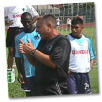Conditioning Considerations for Tournament Play
I think it is important to state my bias up front. I am not in favor of tournament play at any level except for the state, regional or national championship play. Tournaments have no place at the younger developmental ages. Here are my reasons:
Cumulative fatigue severely compromises technical elements and quality of play
Cumulative fatigue predisposes the player to injury both in contact and non-contact situations
Tournaments compromise the players overall development because it can take up to a week for a player to fully recover, therefore a vital week of training is lost
The ideal is for the player to play one game a week, which represents the ideal ratio of training to game play of four to five training days for every game day. Unfortunately this is not the case, so I will give some practical pointers to help you better prepare your players for tournament play from a conditioning perspective. In order to get optimum return from your team’s participation I suggest you enter into the tournament with one of the following specific objectives:
To develop the players for championship play by simulating the environment of a playoff situation
To expose or “showcase” players
To win
Having these specific objectives as part of a season plan will allow you to evaluate the performance in the context of the whole season.
Obviously the conditioning goal throughout the year is to prepare the player to play the entire match or game at the highest degree of efficiency with the least amount of fatigue. Tournament play should not compromise that goal; therefore actual conditioning should not be altered in specific preparation for tournament play. A vital point is to remember that you are not conditioning so much for actual play as you are for the ability to recover adequately between games in order to play effectively in the next game. The specific conditioning considerations are more of a management issue during the actual tournament. The significant training implications are the reduction in the quality of training in the week(s) following the tournament. The following are the intra tournament considerations that can make an appreciable difference for your player in the course of the tournament:
Warm-up – The warm-up before the first game of the day should be the longest and most complete. Each subsequent warm-up does not have to as extensive unless there is more than five hours between games.
Cooldown – This is a must. It should incorporate movement through large ranges of motion as well as static stretching.
Pre-event Nutrition – Be sure to eat. In many tournament situations that I have seen with early morning games the players try to sleep longer and do not rise early enough to eat. They begin the tournament in a depleted state that only gets worse as the tournament progresses. What each player eats is very individual.
Intra-event nutrition – In the second and possibly third game of the day one quarter of a sports bar, at half or during a substitution, with water can help keep energy levels up.
Post event Nutrition – Get carbohydrates into the system within the first twenty to thirty minutes after the game. Research has shown that taking advantage of this window can significantly help maintain glycogen stores.
Hydration - Drink as much possible starting the night before. During any break in the action drink, water is OK. If you use a sports drink carefully look at the sugar content.
Between game recovery/regeneration – Above all get off your feet, if there is adequate time between games five to ten minutes in a swimming pool can really help.
Between day recovery/regeneration – Use a whirlpool followed by a dip in a swimming pool as close after the last game of the day as possible. Be sure to eat foods high in carbohydrates.
Know you players:
What are their fitness levels?
How physically mature are they?
How well do they recover?
What is their skill level?
Carefully monitor minutes played. Use the tournament as a learning tool to gain information about your players and your team. What is each player’s response to fatigue as the tournament progresses? Who does get stronger? Whose performance drops off due to fatigue? This is a plus in that it can give quick directed feedback to enable you to adjust your plan for the remainder of the season.


1 Comments:
First of all, I find your blog to consistently be one of the best things I read throughout my day. I appreciate the time and effort you spend on it and greatly appreciate it.
Second (and relating to this particular post): my principal sport is Ultimate Frisbee. The sport is played entirely in a tournament format where it is common to play 4-5 90 minute games on Saturday and then 1-4 games on Sunday. The conditioning needs for an individual game (very high intensity, short duration sprinting and jumping) are at odds with the endurance requirements of tournament play.
For an athlete to be successful they need to be able to perform on the last game of Sunday (Finals). Obviously having a bigger team and the ideas you provide in this post can do a great deal to help. Do you have thoughts on general ways you'd modify conditioning for adult athletes if all competition took place in the context of tournaments?
Thanks again,
John
Post a Comment
<< Home